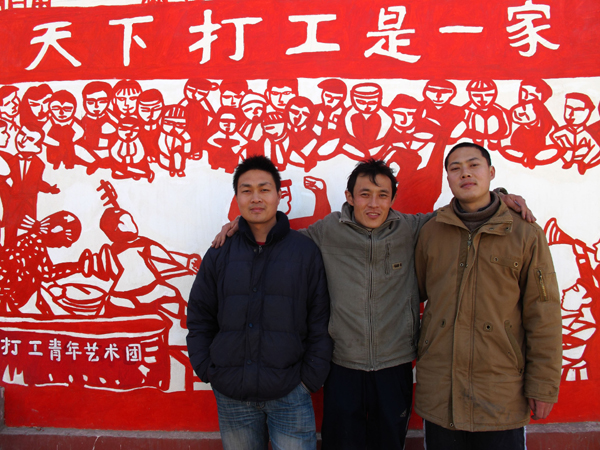Profiles
Workers descend skyscrapers, climb onstage
By He Dan (China Daily)
Updated: 2010-04-13 07:29
 |
Large Medium Small |
Drama and music give voice to migrants' experiences
Beijing - When Sun Heng's school didn't allow him to express his creativity while teaching music, he picked up his guitar and headed for Beijing.
Leaving Henan, he joined the ranks of migrant workers, singing on streets and in subway stations, performing manual labor to support himself.
|
 From left: Sun Heng, Wang Dezhi and Hao Zhixi, members of the New Worker Art Troupe, one of the country’s fi rst art troupes focused on migrant worker art and culture, pose for a photo at Picun village in Chaoyang district, Beijing, on Apr 2.[China Daily] |
In doing so, the now 41-year-old came into contact with migrant workers, toiling beside them, sharing their hopes and pains, and learning what was in their hearts.
He gradually realized the contribution they made to the modernization of the country and encouraged other migrant workers to be proud of their roles.
He wrote a song extolling that pride.
"Working is our glory. We bricked the marvelous skyscrapers, we built the broad highways. No matter how dirty and hard the work we do is, we live proudly as we make money with our sweat and labor," his song went.
| ||||
In the past eight years, the troupe has visited more than 300 construction sites, factories and migrant worker communities with their songs and plays to reach out to the country's migrant workers. It has also released three albums, produced two movies and one documentary, as well as created and staged two dramas.
"We stood up, stepped onto the stage and practiced with our flesh and blood. We played out our real and busy lives. Then we realized art was no longer as mysterious or unreachable as it seemed. We used it to express ourselves and found it quite handy. We decided to carry on," says the introduction for a play created by the New Worker Art Troupe in 2009.
Only eight of the troupe's current 30 or so members are full time, with the rest keeping their migrant jobs and helping with performances at nights or on weekends.
"A large number of migrant workers are not farmers. We work in the cities and want to live with dignity like urban citizens," Sun said.
Wang Dezhi, a co-founder of the troupe, is originally from the Inner Mongolia autonomous region and came to Beijing with the dream of becoming a cross-talk star. He met Sun at the Migrant Women's Club, which belongs to a non-governmental organization. At the club, both of them volunteered to play music and perform cross-talk every Saturday.
Wang later helped Sun form the art troupe. "We want our voices to be heard, and to enjoy more rights in society," Wang said.
They also received an endless stream of inspiration from the audience.
"At the beginning, we just wanted to amuse ourselves. We didn't expect other migrant workers' to echo our thoughts after they saw our performances. They told us their experiences such as homesickness and harsh working conditions. We felt embarrassed when we couldn't help them," Sun said.
"Once in 2006, we helped a blind masseur ask for back pay. The boss hired six musclemen to beat us up right in front of the local bureau of labor and social security. But we didn't give up and got the money back. After that, we knew we could do more for our migrant worker friends," said Sun.
They used 75,000 yuan ($11,000) from the sale of their first album to establish a school for migrant workers' children in 2005.
Sponsored by non-governmental organization Oxfam Hong Kong in Beijing Office, they also founded the first private museum to record the history of migrant workers in China in 2008.
Now members of the New Worker Art Troupe are very confident about their identity.
"We want to be a loudspeaker for hundreds of millions of migrant workers in China. We try to develop our own culture as a special group in the society. We intend to record our history by ourselves. Our perspective may be subjective, but it is closer to reality," Wang added.
Hao Zhixi, who joined the art troupe in 2008, worked for more than five years in factories in Shenzhen. Hao likes writing poems and occasionally takes some supporting roles in plays.
"I'm happy with life here. In the past, I was always asked to do this and that. I felt depressed. Now, I can do something I really like and everyone is equal in this troupe. That feels good," Hao said.
The art troupe's latest burlesque, Village in the City, which ran at the No 9 Theater in Beijing from March 23 to March 26, played to large crowds.
The art troupe is changing people's minds about migrant workers.
"Now I know they are not the stereotyped migrant workers I had in my mind," a member of the audience surnamed Wang told China Daily after the show.
"Although they belong to the less advantaged of society, they are a group of young people with thoughts, ambition and wisdom."
China Daily











